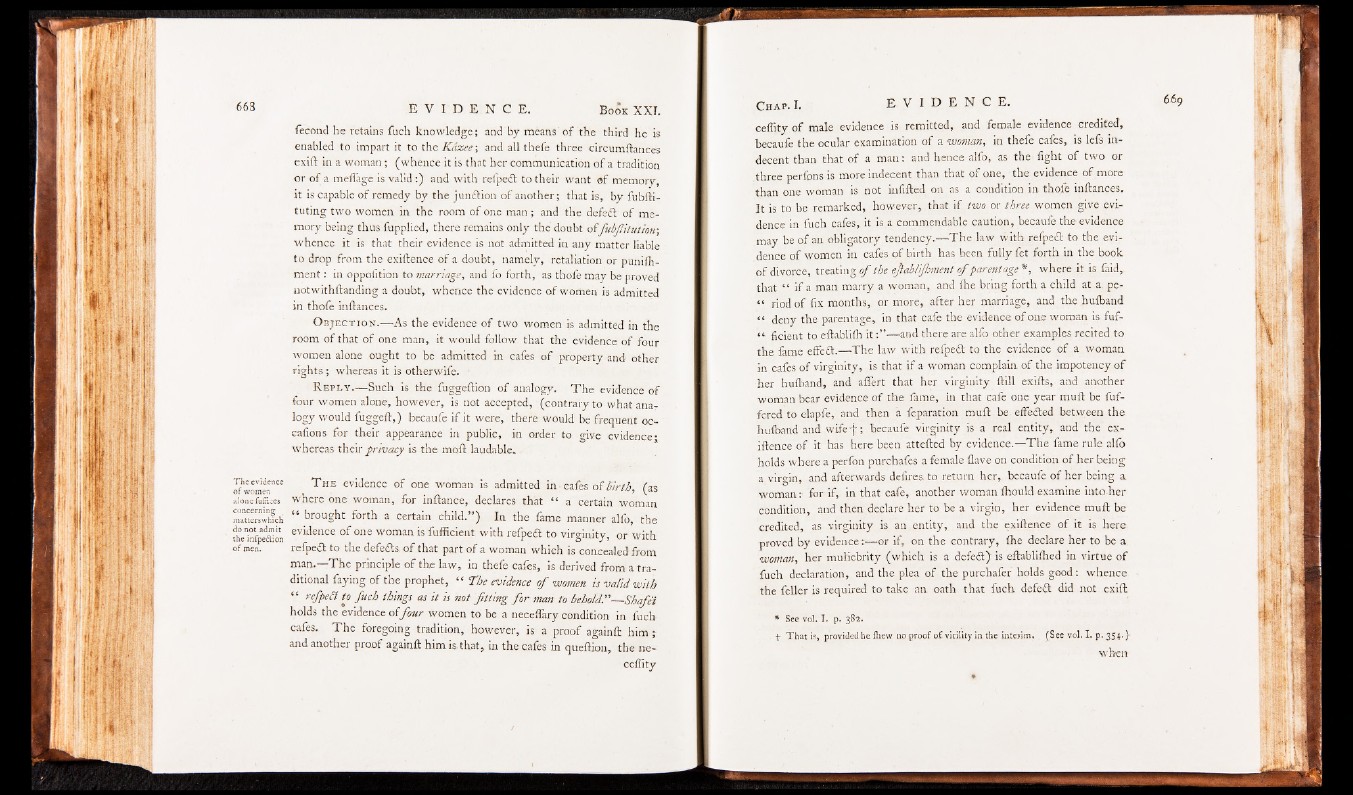
The evidence
o f women
alone fuffices
concerning
matters which
do not admit
the infpe&ion
o f men.
lecond he retains fuch knowledge; and by means'of the third he is
enabled to impart it to the Kdzee; and all thefe three circumdances
exift in a woman ; (whence it is that her communication of a tradition
or of a medage is valid;) and with refpeft to their want of memory,
it is capable of remedy by the junction of another; that is, by fubdi-
tuting two women in the room of one man; and the defeft of memory
being thus fupplied, there remain^ only the doubt offubjlitutiotr,
whence it is that their evidence is not admitted in any matter liable
to drop from the exidence of a doubt, namely, retaliation or punilh-
ment: in oppolition to marriage, and fo forth, as thole may be proved
notwithdanding a doubt, whence the evidence of worhen is admitted
in thofe indances. -
O b j e c t i o n .— As the evidence of two women is admitted in the
room of that of one man, it would follow that the evidence of four
women alone ought to be admitted in cafes of property and other
rights; whereas it is otherwife. •
R e p l y .— Such is the fuggedion of analogy. The evidence of
four women alone, however, is not accepted,' (contrary to what analogy
would fugged:,) becaufe if it were, there would be frequent oc-
eafions for their appearance in public, in order to give evidence;
whereas their privacy is the mod laudable.. .
T he evidence of one woman is admitted in • cafes of birth, (as
where one woman, for indance, declares that “ a certain .woman
brought forth a certain child.” ) In the lame manner alio, the
evidence of one woman is fufficient with refpedt to virginity, or with
refped to the defeats of that part of a woman which is concealed from
man.—The principle of the law, in thefe cafes, is derived from a traditional
faying of the prophet, “ The evidence o f women is valid w ith
“ rcfpeEl to fuch things as it is not fitting fo r man to behold:' — Shafei
holds the evidence of four women to be a neceflary condition in fuch
cafes. The foregoing tradition, however, is a proof againd him ;
and another proof againd him is. that, in the calcs in quedion, the necedity
of male evidence is remitted, and female evidence credited,
becaufe the ocular examination of a woman, in thefe cafes, is lefs indecent
than that of a man: and hence alfo, as the' dght of two or
three peribns is more indecent than that of one, the evidence of more
than one woman is not infided on as a condition in thole indances.
It is to be remarked, however, that if two or three women give evidence
in fuch cafes, it is a commendable caution, becaufe the-evidence
may be of an obligatory tendency.— The law with refpeft to the evidence
of women in cafes of birth has been fully fet forth in the book
of divorce, treating o f the efiablifoment o f parentage * , where it is faid,
that “ if a man marry a woman, and Ihe bring forth a child at a. pe,
“ riod of dx months, or more, after her marriage, and the.hulband
“ deny the parentage, in that cafe the evidence of one woman is fuf-
H ficient to edablilh it B — and there are alfo other examples, recited to
the fame effeft.— The law with refped to the evidence of a woman
in cafes of virginity, is that if a woman complain of the impotency of
her hulband, and affert that her virginity dill exids, and another
woman bear evidence of the fame, in that cafe one year mud be differed
to elapfe, and then a feparation mud.be. effected between the.
hulband and wife-j;; becaufe virginity is a real entity, and the ex.-
iftenee of it has here been atteded by evidence.—The fame rule alio
holds where a perfon purchafes a female Oave on.condition of her being
a virgin, and afterwards delires. to return her, becaufe of her being a
woman; for if, in that cafe, another woman Ihould examine into her
condition, and then declare her to be a virgin, her evidence mud be
credited, as virginity is an entity, and the exidence of it is here,
proved by evidence:— or if, on the contrary, die declare her to be a.
woman, her muliebrity (which is a defedt)' is edablilhed in virtue of
fuch declaration, and the plea of the purchafer holds good: whence
the feller is required to take an oath that fuch defeat did not exid
* See vol. I. p. 38’2.
t That is, provided he filew no proof. o£ virility in the inteFim. (See vol. I. p-3 5 4 *)'
ween